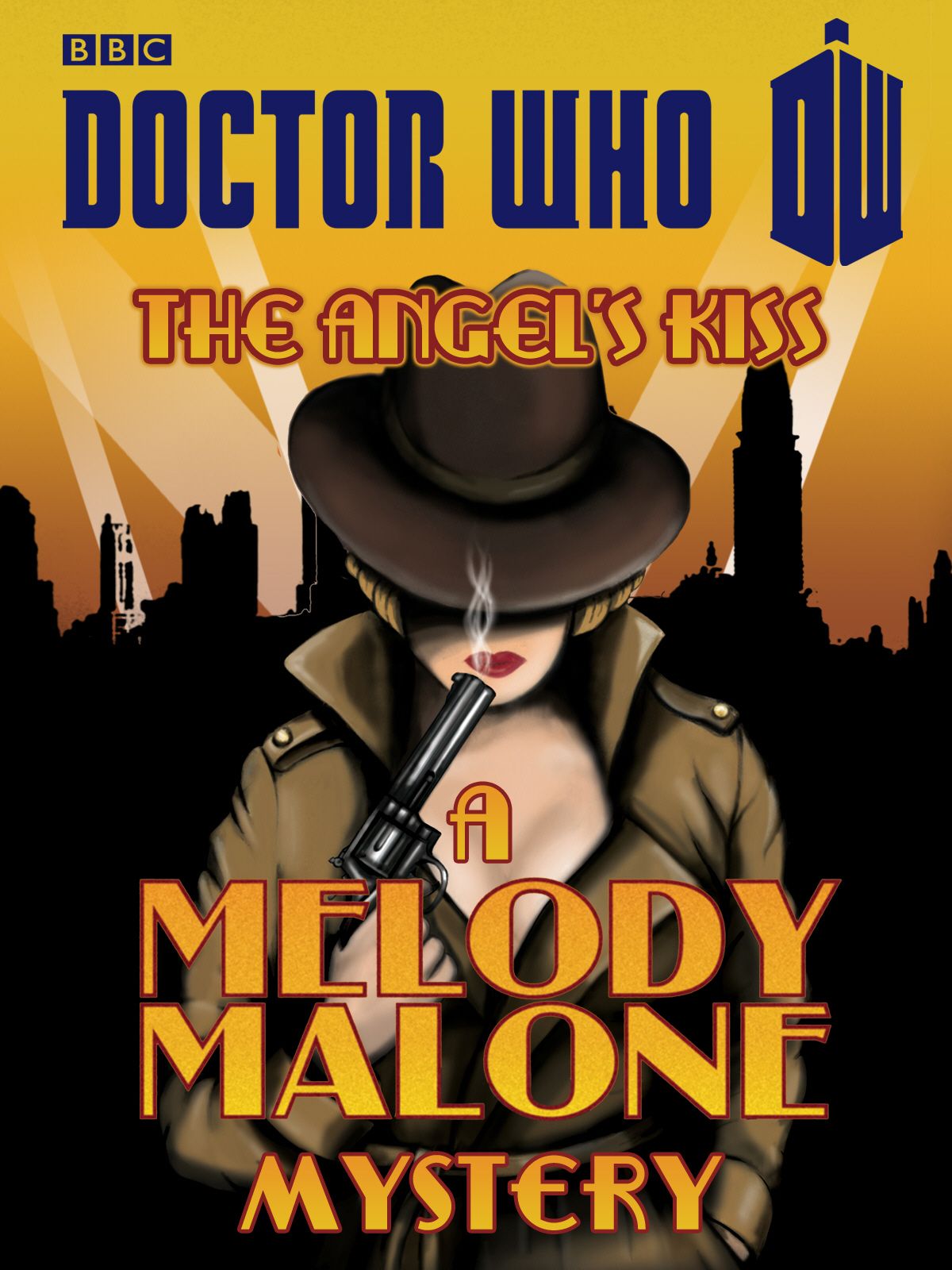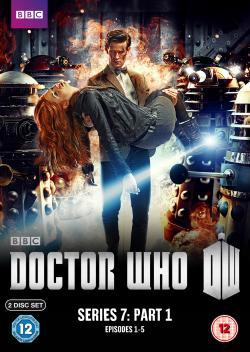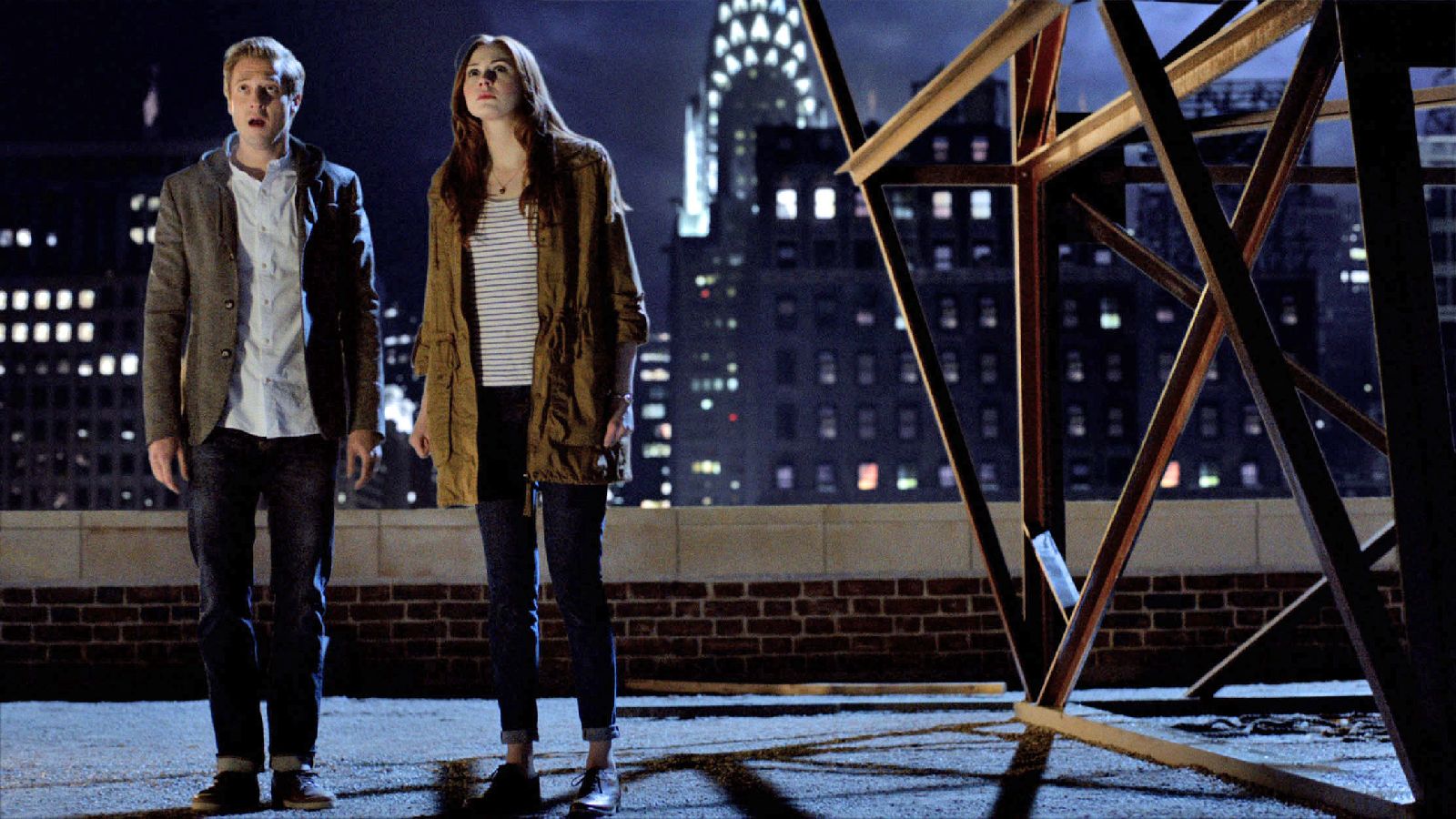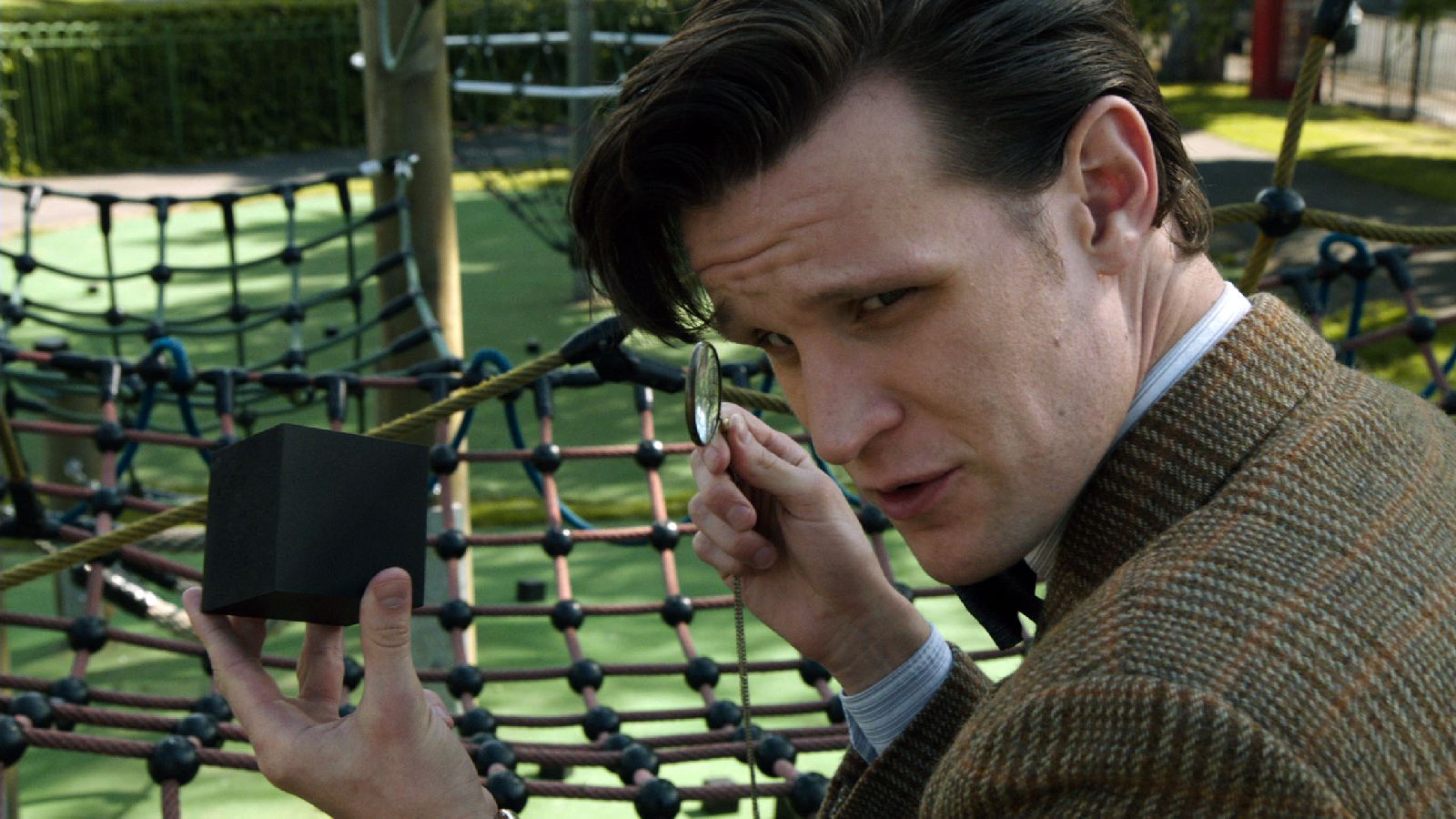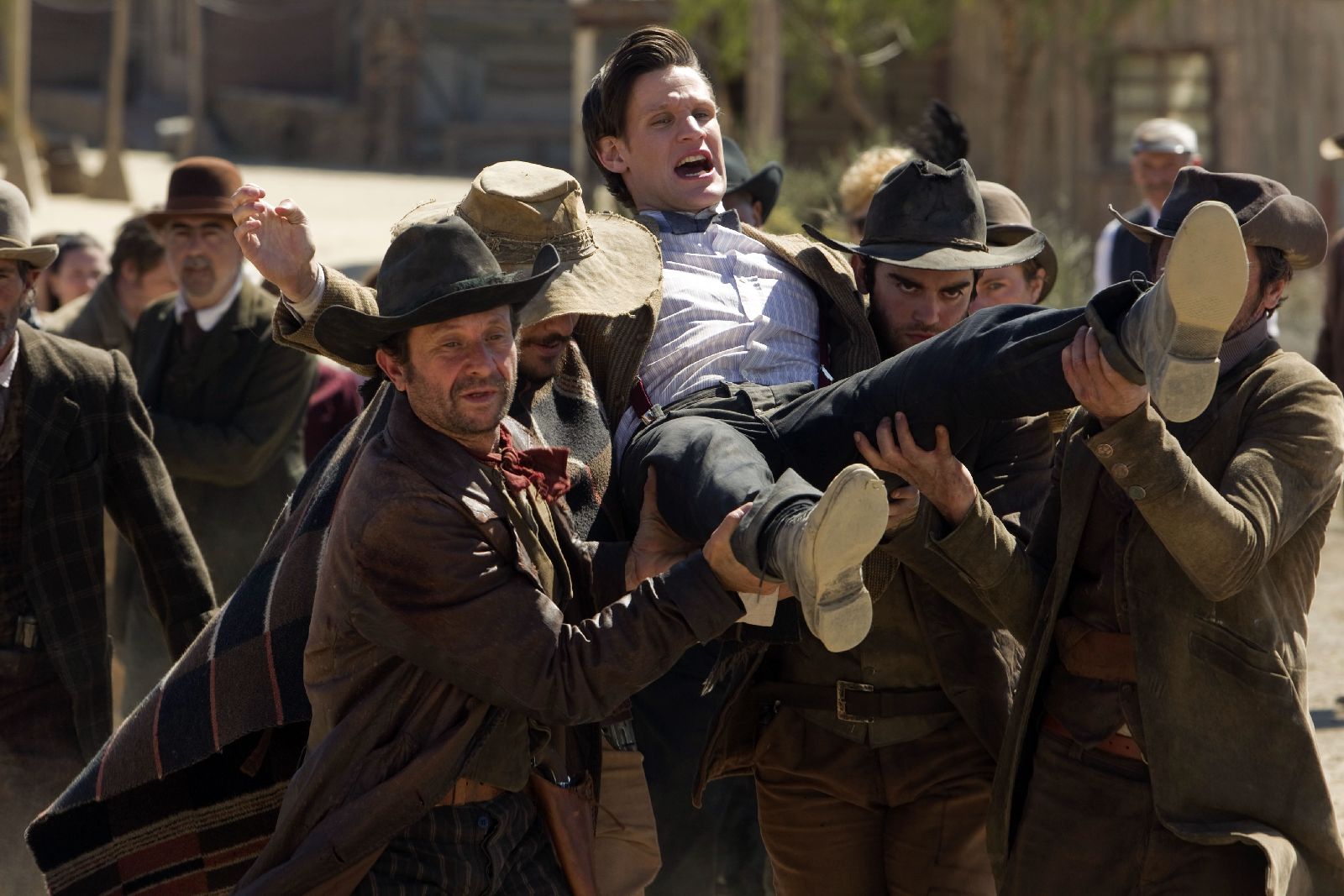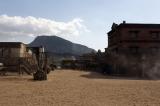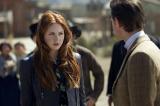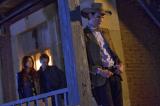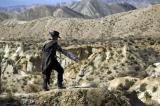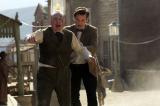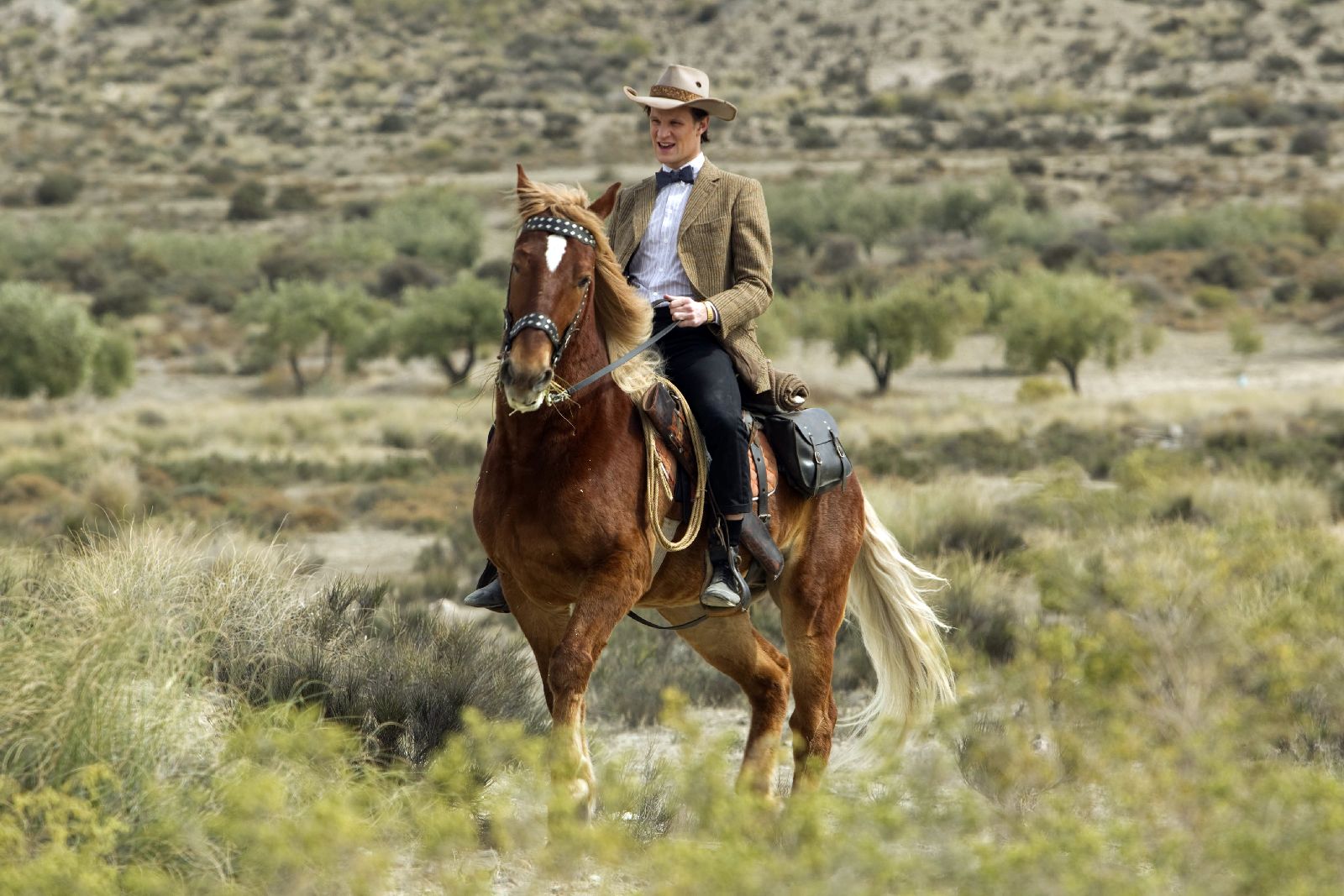Written by Matthew Kilburn
This review contains plot spoilers and is based on the UK preview of the episode.North America's cultural influence is woven around
Doctor Who like a double helix. The programme was born to a British public broadcaster already reliant on Hollywood for much of its output, and which had charged an iconoclast from Canada with the task of taking its native dramatic forms and reshaping them for a medium where the United States spent most and shouted loudest.
Doctor Who could be characterised as the child of a secret encounter between the American adventure story and the classic serial. Selected American television westerns were thought by the BBC in the early 1960s to be unsophisticated material suitable for late afternoon viewing, although when under the purview of the old Children's Department, violent incidents were carefully removed.
Doctor Who at first sought not to be the simple morality play British broadcasting creatives perhaps imagined the American western to be, though its influence was evident early on:
Marco Polo had strong elements of the pioneer caravan form, and there is some irony in that
The Gunfighters, an anti-western set in the American west using characters and situations borrowed from the genre, almost bookends the start of a period where the Doctor becomes much more like the nomadic cowboy than he was before, solving problems as an outsider rather than becoming embedded in his host society, and slipping away before that society can find him a role in its future.
Production office and subsequently fan mythology stated that
The Gunfighters had shown that the western was not a genre
Doctor Who did well; and yet for part of the 1970s, in the shadow of that '
Wagon Train to the stars',
Star Trek, several
Doctor Who stories could have been told in the western genre with minimal alterations beyond setting. Perhaps the reasons
Doctor Who never visited the western after
The Gunfighters were not only that the BBC wouldn't risk dressing a quarry or a Television Centre studio as a late-nineteenth century American town and invite unfavourable comparison with American film series, but that it would also draw attention to the programme's similarities to a genre from which it needed to differentiate itself for reasons of cultural identification (as a 'BBC' production) and of audience suspension of disbelief.
Once the programme was liberated from the multicamera studio, the western became a genre for
Doctor Who to slay, once the time was right. In the 1990s,
Philip Segal listed a remake of
The Gunfighters among his possible scenarios for a
Doctor Who series. When
Russell T Davies drew up his guide to
Doctor Who's format before production on the revived series began in 2004, his 'adventures in the human race' described potential space adventures in terms of human pioneers, language reminiscent of the American frontier.
It's taken seven series to reach the American west, and it is already one self-consciously filtered through European eyes and hands, in the shape of the western sets of Fort Bravo and Oasys near Almeria in Spain, known from the films of Sergio Leone and others. This might create expectations of a more cynical, unidealised depiction of the western setting, and to a limited extent these are met. It's to the credit of
A Town Called Mercy that it acknowledges the moral uncertainties and ambivalences of the characters, something for which
Dinosaurs on a Spaceship had little room.
A Town Called Mercy's setting combines preoccupations of the classical western, religious faith, social stability and the development of the community, with some self-aware historical contextualisation. The town of Mercy draws on a cultural commentator's view of the western as American nation-building device. In Isaac's words, it is five years after 'the War', presumably the American Civil War. In Mercy, people can find second chances; it encapsulates the new America of the frontier as imagined by later generations, seeking to create a better future by breaking from past divisions. Although these are never specified, making the town's preacher African-American is shorthand for one of them. It also distances
A Town Called Mercy from a purely white vision of the United States, even if only at a token level. More successfully, the presence of a transgender horse satirises the heterosexual heroism of the traditional west and (through the name Susan) acknowledges that this is an old, old target, with its echoes of the song '
A Boy Named Sue'.
The preacher's prominence is important less for his ethnicity than for his presence as a marker of the role of religious belief in this story. The luckless Kahler-Mas is told in the pre-credits sequence to make peace with his gods, and Kahler-Jex later shows that his outlook on life and death is shaped by his religious conception of guilt and the afterlife. The Gunslinger, when challenged, says that the Kahler gods are no longer his; is this simply because his faith has been destroyed by the betrayal which turned him into a cyborg, or because faith is for those of the flesh, or because Jex had assumed the mantle of a creator-god? As the Gunslinger - Tek - regards himself as a 'monster', perhaps it is the latter, Jex having reduced Tek's rank in the order of creation.
If Mercy is an American utopia, a small town somehow surviving in the desert with little obvious means of support, its siege by the Gunslinger is a powerful image of later American dystopias. The Gunslinger's debt to RoboCop and the Terminator is obvious. His prosthetics are material expressions of the brutal combat experiences endured by Rambo and the friends of
The Deer Hunter. In
Doctor Who, this kind of war is to be imagined or viewed from the sidelines, but the screams of the unsuccessful victims of Jex's cyborg conversion programme are more than enough to help us. The Gunslinger's name and roboticness owe much to Yul Brynner's character in Westworld, but his poncho-like outfit recalls Clint Eastwood's Man With No Name from the Dollars Trilogy, as does the post-Civil War setting.
The Gunslinger suffers too because he has had another's dual nature imposed upon him: Jex's name and profession suggest Dr Henry Jekyll, from a gothic storytelling tradition. The American utopia has been made possible by his scientific expertise. Without Jex, Mercy would be low-tech even by the standards of 1870; it doesn't appear to be a railroad town. However, like Jekyll, Jex has been avoiding the truth about his own nature, and when this repressed side emerges it is sneering, supercilious, and callous. The result of his interference in Mercy is its isolation within what is in appearance and effect a magic circle.
A Town Called Mercy is an accomplished construction of histories and fictions received and revised, into which arrive the Doctor, Amy and Rory. The solitary Doctor of the first shot momentarily points to the debt the Doctor owes to the lone stranger of western myth, but Amy and Rory then appear, to remind us that the Doctor likes company, as the Daleks recognised two episodes ago. The Doctor begins this episode uncomfortably balanced again between the childlike and the childish, a Norman Wisdom or Eric Morecambe sure that he knows how to behave in a western saloon bar but unconcerned if his conduct is, after all, out of place. After two episodes where the Doctor's external insouciance seems to be vindicated, it is welcome to see him be made uncomfortable by his dilemma and have to work out what the right course of action is.
Isaac tells the Doctor that both aliens are good men who just forget that sometimes. Though there is no speech in which the Doctor agonises about the Time War, Jex's experiences and defence of his actions recall the trauma the Doctor shared with the audience in previous years. Jex might have decided where his debt was to be paid; so, perhaps, has the Doctor. Isaac's death temporarily removes the Doctor's outsider status; as marshal, he becomes part of Mercy and upholds justice against the temptation to be cruel and cowardly. This is all played successfully as credible character development. The lives and motives of human beings are depicted as focused on the smaller picture and shaped by fear of the unknown; no wonder the Doctor would prefer to deal with a Dalek any day.
Matt Smith is always watchable but his Doctor is at his best when he gets to show his range. There is more room in this story for contemplation of the grey areas of existence, and that saving people isn't just about running around wisecracking amidst explosions. The sequence where the Doctor persuades
Sean Benedict's Dockery (definitely a kinsman of Unforgiven's would-be gunman, the Schofield Kid) from a moral misjudgement is quieter than much of what we have seen this season, and the better for it. The episode as a whole is seemingly slower than Dinosaurs, but this is an illusion of pacing, and a further indicator that Saul Metzstein is an asset to
Doctor Who's directing roster.
This is a good though problematic episode for Amy.
Karen Gillan's performance is increasingly reminiscent of
Elisabeth Sladen's Sarah, and her costume's leather jacket is reminiscent of Sarah's early outfits as well as the mature Sarah of
The Sarah Jane Adventures. As Sarah often was, Amy is here the only female character with a substantial part. Mercy is a town of patriarchs: it has an Abraham (
Garrick Hagon, fussily and methodically measuring light years from his youthful Ky) and an Isaac (
Ben Browder, dirty in desert dust but clear-sighted and confident in his faith in his town's mission). Yet it is women who tell its story and foster identity. Gender stereotyping it may be, but this is what Amy successfully does in this story, recalling the Doctor to what she has learned from him, and overruling Rory's emphasis on expedient action. We could probably have done without the stirring music as Amy makes her 'we have to be better than him' speech, though.
Murray Gold seems to enjoy drawing from a musical tradition he's not yet exploited in
Doctor Who, with guitar strings referencing Ennio Morricone's scores from the Dollars trilogy. Once inside Jex's spacecraft, there is a riff on 'Journey of the Sorcerer' too, perhaps a nod to the ship's
Hitch-Hiker's Guide to the Galaxy-like graphics. The Doctor's farewell theme borrows from earlier in Gold's corpus, for another tale of pioneer idealism undermined from within,
The Doctor's Daughter. We may have been here before, but
A Town Called Mercy is the more coherent of the two and more confident in its use of motifs.
This episode perpetuates the electric bulb motif seen in stories earlier this season. Within the context of the episode's plot, it suggests the fragility of Jex's electric lighting system and informs Jex that the Doctor has found his intact spacecraft. However, there are other fluctuations which are less easily explained in this way, which include one where Amy explains that she, Rory and the Doctor were on their way to Mexico and the Day of the Dead. The Doctor's face is sorrowful here; like Henry in
Steven Moffat's oft-cited inspiration,
The Time-Traveller's Wife, he might have foreknowledge of the end of the most important relationship in his life.
Toby Whithouse's writing has often relied upon awareness and exploration of the stories people tell themselves and each other to confirm their senses of self and get through life on a day-to-day basis.
A Town Called Mercy is a good example of this. It is sustained by a unified visual sense, with strong cinematography and design. In its play with the history of places and people and the representation of that history in fiction, it is a great advance on 2010's
The Vampires of Venice. In its blending of western and fairytale genres it restates
Doctor Who's magpie nature and reinforces the programme's claim to be identity-myth itself while proving that it can be at home in the imagined American past and thus viable in the globalised present.
